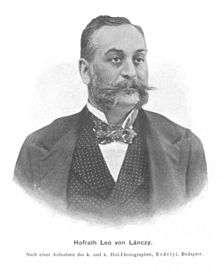Leó Lánczy

Leo Lánczy (born as Leo Lazarsfeld, Pest, May 10, 1852 – Budapest, January 26, 1921) was a Hungarian Jewish banker, entrepreneur, merchant, financier and politician.[1] According to Forbes he was the 9th richest person in Hungary on the turn of the 19th century with a net worth of 15 million Hungarian pengő.[2]
After having been connected for several years with the Anglo-Hungarian Bank and the Ungarische Boden-Credit-Gesellschaft, he was elected in 1881 director-general of the Hungarian Bank of Commerce, in which capacity he contributed greatly to the promotion of Hungarian commerce, and exerted an important influence on the commercial policy of the country. He was especially successful in enlarging Hungarian credit in foreign countries, and in making the finances of Hungary independent of those of Vienna. In 1893 the district of Zsolna returned him to the Hungarian Parliament, where he took a prominent part in the currency conferences; and in 1896 he was member of the parliament as deputy of the city of Miskolc. Lánczy received in 1891 the Order of the Iron Crown, and subsequently the "Comthur-Kreuz" of the Order of Franz Joseph, in recognition of his services in promoting the Millennium Exposition of 1896. In 1902 he received the title of Hofrath. Lánczy was a convert to Christianity.
References
